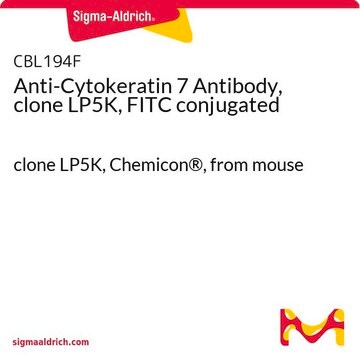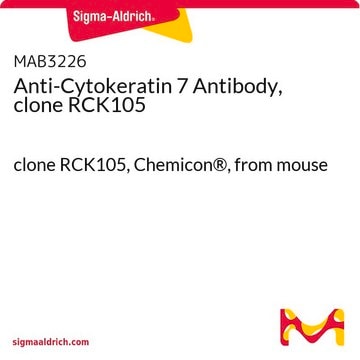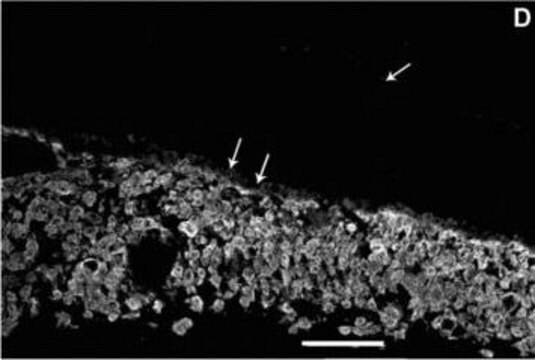MAB3554
Anti-Cytokeratin 7 Antibody, clone OV-TL 12/30
clone OV-TL 12/30, Chemicon®, from mouse
Synonyme(s) :
Anti-Anti-CD20, Anti-Anti-CK-20, Anti-Anti-CK20, Anti-Anti-K20, Anti-Anti-KRT21
About This Item
Produits recommandés
Source biologique
mouse
Niveau de qualité
Forme d'anticorps
purified antibody
Type de produit anticorps
primary antibodies
Clone
OV-TL 12/30, monoclonal
Espèces réactives
human
Fabricant/nom de marque
Chemicon®
Technique(s)
flow cytometry: suitable
immunocytochemistry: suitable
immunohistochemistry: suitable (paraffin)
western blot: suitable
Isotype
IgG1
Numéro d'accès NCBI
Numéro d'accès UniProt
Conditions d'expédition
dry ice
Modification post-traductionnelle de la cible
unmodified
Informations sur le gène
human ... KRT7(3855)
Description générale
Spécificité
Immunogène
Application
Immunohistochemistry on frozen tissue sections fixed with methanol. The antibody is also effective on paraffin embedded tissue sections that have been pretreated with 0.1% pronase/0.1% trypsin in PBS, 0.5% pepsin in 0.01N HCl or microwave pretreatment.
Optimal working dilutions must be determined by the end user.
Cell Structure
Cytokeratins
Liaison
Forme physique
Stockage et stabilité
Autres remarques
Informations légales
Clause de non-responsabilité
Vous ne trouvez pas le bon produit ?
Essayez notre Outil de sélection de produits.
Code de la classe de stockage
12 - Non Combustible Liquids
Classe de danger pour l'eau (WGK)
WGK 2
Point d'éclair (°F)
Not applicable
Point d'éclair (°C)
Not applicable
Certificats d'analyse (COA)
Recherchez un Certificats d'analyse (COA) en saisissant le numéro de lot du produit. Les numéros de lot figurent sur l'étiquette du produit après les mots "Lot" ou "Batch".
Déjà en possession de ce produit ?
Retrouvez la documentation relative aux produits que vous avez récemment achetés dans la Bibliothèque de documents.
Notre équipe de scientifiques dispose d'une expérience dans tous les secteurs de la recherche, notamment en sciences de la vie, science des matériaux, synthèse chimique, chromatographie, analyse et dans de nombreux autres domaines..
Contacter notre Service technique








